
Finally, A May Festival in Full Bloom
by Hannah Edgar
It’s all too easy to brand 2020 and 2021 as the “Should Years.” In 2020, the May Festival should have featured John Adams’ epic opera-oratorio El Niño, with the composer himself on the podium. It also should have unveiled a new choral-orchestral co-commission by composer Jessie Montgomery—with a libretto by her mother, the writer and stage artist Robbie McCauley, who passed away last summer.
Nor was it possible to revive those works in 2021, when low vaccination and steady positivity rates made it too risky to convene the full chorus with orchestra. Instead of preparing for its 150th anniversary in 2023, the May Festival faced arguably the greatest threat to its existence since its founding.
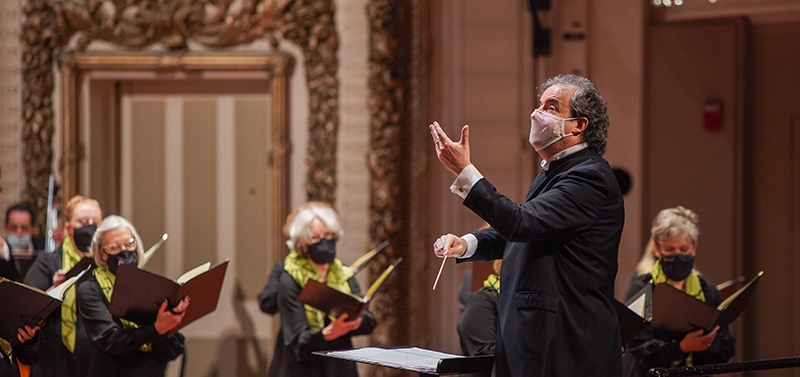
But Robert Porco would like to offer a reframe. Director of Choruses of the May Festival since 1989, he says he’s never seen as many singers clamber to join the May Festival Chorus as he has this season, welcoming 30 new members out of its 120 volunteer singers. And he’s proud of what the May Festival was able to achieve in 2021, even as musicians contorted themselves under unfamiliar strictures: Choristers sang masked and in reduced numbers in front of a widely spaced orchestra and Principal Conductor Juanjo Mena, whose gestures were live-streamed onto a monitor for singers to follow. So far this season, the choir has continued rehearsing and performing with mitigation protocols.
“I’m on the side of caution, and we’ve done very well. No one got sick, and artistically it worked; singing masked doesn’t affect the sound nearly as much as people think,” Porco says, calling between rehearsal days from a hotel room in Cincinnati.

Though unable to reunite with his beloved choir for much of the pandemic, Porco remained connected to the May Festival Chorus in other ways: He started Bob’s Kitchen (mayfestival.com/bobs-kitchen), a series of beloved Porco family recipes he shared online with the May Festival community, and he called each Chorus member three times during the pandemic. During those phone conversations, Porco talked to many choristers at length about their own extra-musical passions, sometimes for the first time.
“In a chorus like this, there’s always somebody who’s an expert in something. I happen to specialize in music, but we might have someone who specializes in liver transplants, or someone who’s a preacher,” he says. “I’ve always found it humbling. It sounds a little sentimental or corny, but it is a bit of a family thing. These people only see each other once a week, but there’s this sense of community. Sometimes it appears to me they enjoy music more than some professionals do.”
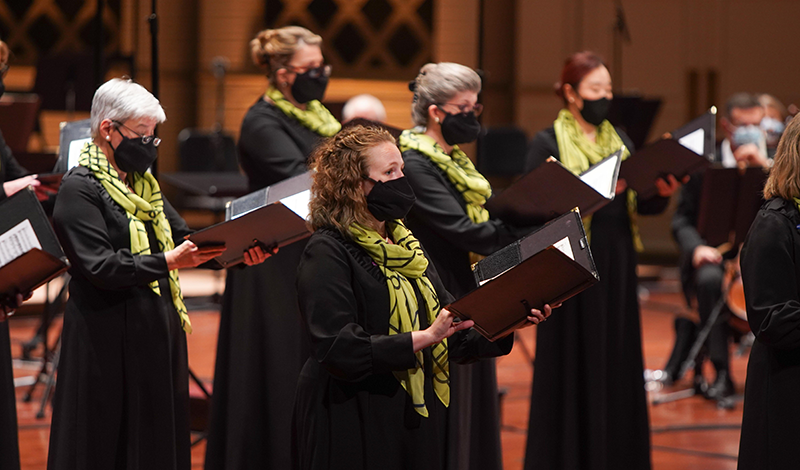
Now, the programs once promised in 2020 will resound at last in Music Hall—a triumphant preamble to next year’s sesquicentennial celebrations. For one, Adams’ El Niño is back, with the composer at the helm as originally planned. Once called “a Messiah for the modern age” by the Los Angeles Times, El Niño tells the story of Jesus’ nativity through maximalist choral-orchestral forces and Peter Sellars’ freewheeling, bilingual libretto, which taps sources as far-flung as Scripture, medieval mystery plays, and 20th-century Latin American poetry.
“I think this piece will surprise the audience a lot, because it’s not normally programmed,” Mena says. “It’s very complex, with a lot of soloists.”
You could say that again. El Niño calls for soprano, mezzo-soprano, baritone and three countertenor soloists, all on top of beefed-up ensemble forces: a mixed chorus, a children’s choir and an orchestra teeming with auxiliary percussion. Adams isn’t shy about making El Niño’s singers sweat, either. (The 75-year-old composer admitted as much to us in a written interview—see sidebar on p. 11.) Porco knows that all too well, having prepared the choir for John Adams’ On the Transmigration of Souls in 2008, Harmonium in 2014, and The Wound-Dresser last season. Luckily, he knows what Adams likes in his works—crisp, clear diction and a robust sound. That just leaves the hard parts.
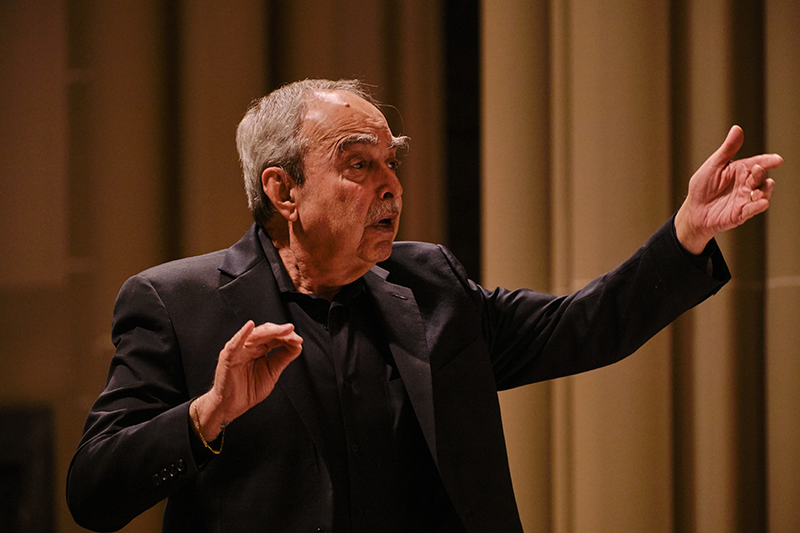
“John writes these things that are much more difficult than they sound because of where they happen in the bar. For example, he’ll take the same motive in a minimalistic style and put it after the first beat, then after the second beat, and then on the third beat,” Porco says. “It’s very intricate, and I want to be sure to do exactly what’s written.”
On top of those technical demands, much of El Niño’s text is in Spanish—a language underrepresented in classical choral repertoire, if not at this year’s Festival. The May 27 program, “South American Epics,” features the Festival premiere of Cantata Criolla (“Creole Cantata”), a searingly dramatic choral-orchestral epic that garnered wide acclaim for its late composer, Antonio Estévez (1916–1988), after it premiered in 1954. Cantata Criolla’s Faustian premise is a familiar one in classical repertoire; subtitled “Florentino, who sang with the Devil,” Estévez’s version imagines a sing-off between the verse-spinning herdsman Florentino (tenor Santiago Ballerini) and the Devil (baritone Gustavo Castillo), whom he passes on the open plain.
20th-century Brazilian composer Heitor Villa-Lobos (1887–1959) is much more of a household name than Estévez. Nonetheless, his Chôros No. 10, “Rasga o Coração” (“Rend the Heart”)—sung in Portuguese and often programmed alongside Cantata Criolla—also marks a Festival first.
“We were thinking about diversity and the different cultures that we have also in Cincinnati. There are a lot of Latin people [here],” says Mena, himself a native Spanish speaker. “Why not move the programming a little in this area?”
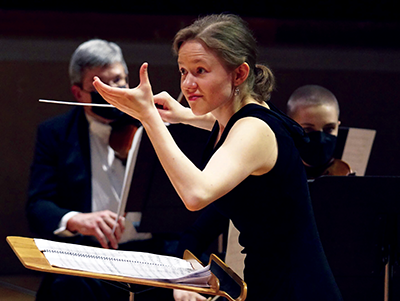
North America gets in on the fun, too. On May 22, soloists, chorus and orchestra perform a concert version of the rapier-witted operetta Candide by Leonard Bernstein (1918–1990), the United States’ eternal wunderkind. Leading the performance is Austrian conductor Katharina Wincor (pronounced VIEN-sor), a 27-year-old phenom who’s cinched podium engagements at the Salzburg Festival, Bruckner Orchestra Linz, and Brevard Music Center this season. She was named assistant conductor of the Dallas Symphony Orchestra in 2019, when she was just 24.
Part of her winning Dallas audition? The Overture to Candide. But Wincor says the May Festival performance marks her first time conducting Bernstein’s music professionally. To prepare, she’s hitting the books—including Voltaire’s original satire, which she read cover to cover.
“I didn’t grow up in America, where [Bernstein’s music] is just an everyday thing,” Wincor says. “One of the big parts for me is listening to the music and talking to musicians that have played it a lot. That’s how I would expect it the other way around: What if someone has to learn something very Austrian?”
Wincor’s thoroughness and podium manner caught Juanjo Mena’s eye early on when he served on the jury for the 2020 Gustav Mahler Conducting Competition in Bamberg, Germany. Wincor placed third in that competition, which helped launch the careers of Gustavo Dudamel, Benjamin Shwartz, David Danzmayr, and many more.
“It was a surprise: ‘Wow, this is a very high level,’” Mena remembers of her competition performance. “I had a good feeling about her from the beginning.”
It’s fitting that this year’s May Festival brings together two very different guest conductors: one a towering figure in the classical music establishment (Adams), the other a fresh-faced rising star (Wincor).
Commissioned to commemorate 100 years of women’s suffrage in the United States, Jessie Montgomery’s I Have Something to Say—which, along with Beethoven’s Ninth Symphony and excerpts from Fidelio, concludes the Festival—hosts a similar communion between past and future by imagining a meeting between the august abolitionist Sojourner Truth and contemporary climate activist Greta Thunberg. Like El Niño, I Have Something to Say weaves a narrative tapestry from many sonic strands: mixed chorus, children’s chorus and orchestra, who are tasked with some light stage direction (see sidebar on p. 13). (Think Haydn’s “Farewell” Symphony, but set in an unspecified tribunal chamber.)
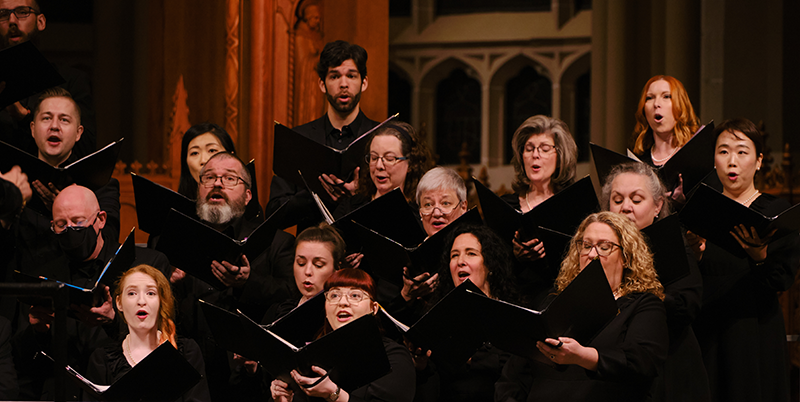
It’s not every day a premiere is nestled next to Beethoven’s towering choral-orchestral masterpiece, which is often content to occupy an entire program. But Mena can’t imagine a better fit than Montgomery’s piece, nor a more timely message.
“There are many years between [Truth and Thunberg], but for me, their message is potent, especially alongside Beethoven 9 and Fidelio,” he says. “They talk about freedom; they talk about rights. This work really celebrates the elder and younger generations of women who have fought and continue to fight the ongoing struggle for us and all people to be free.”
In that struggle, and all others, may the last two years be our guide: Less fretting about the “should,” more seizing upon the “could.” And “did.”